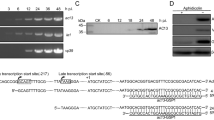Abstract
Orf68 (ac68) of Autographa californica multiple nucleopolyhedrovirus (AcMNPV) is identified to be an early gene, but its transcription start site remains unknown. The coding sequence of ac68 overlaps 280-bp leading sequence and 159-bp coding sequence of lef3 (ac67). In this study, the transcription start site of ac68 was determined by 5′ RACE analysis to be 18 nucleotides upstream from the start codon. In order to investigate the effect of ac68 deletion on virus propagation, we generated a bacmid with an ac68 knockout by deleting 360-bp inside the ac68 gene, which also deleted 220-bp leading sequence of lef3. Production of infectious budded virus and formation of nucleocapsids and occlusion bodies exhibited wild-type patterns of virus propagation in Sf-9 cells infected with the mutant bacmid. The result demonstrated that ac68 was not an essential gene for viral propagation which was confirmed by further deletion of ac68, and disruption of the lef3 leading sequence did not affect viral propagation. Ac68 was the second auxiliary gene discovered besides Ac133 (alk-exo) among the 30 core genes of AcMNPV.






Similar content being viewed by others
References
Herniou EA, Olszewski JA, Cory JS, O’Reilly DR (2003) The genome sequence and evolution of baculoviruses. Annu Rev Entomol 48:211–234
Jakubowska AK, Peters SA, Ziemnicka J, Vlak JM, van Oers MM (2006) Genome sequence of an enhancin gene-rich nucleopolyhedrovirus (NPV) from Agrotis segetum: collinearity with Spodoptera exigua multiple NPV. J Gen Virol 87:537–551
Blissard G, Black B, Crook N, Keddie BA, Possee R, Rohrmann GF, Theilmann DA, Volkman L (2000) Family Baculoviridae. Academic Press, San Diego
Granados RR, Lawler KA (1981) In vivo pathway of Autographa californica baculovirus invasion and infection. Virology 108:297–308
Keddie BA, Aponte GW, Volkman LE (1989) The pathway of infection of Autographa californica nuclear polyhedrosis virus in an insect host. Science 243:1728–1730
Ayres MD, Howard SC, Kuzio J, Lopez-Ferber M, Possee RD (1994) The complete DNA sequence of Autographa californica nuclear polyhedrosis virus. Virology 202:586–605
Wang Y, Wu W, Li Z, Yuan M, Feng G, Yu Q, Yang Kai, Pang Yi (2007) ac18 is not essential for the propagation of Autographa californica multiple nucleopolyhedrovirus. Virology 367:71–81
Yamagishi J, Burnett ED, Harwood SH, Blissard GW (2007) The AcMNPV pp31 gene is not essential for productive AcMNPV replication or late gene transcription but appears to increase levels of most viral transcripts. Virology 365:34–47
Lin G, Blissard GW (2002) Analysis of an Autographa californica multicapsid nucleopolyhedrovirus lef-6-null virus: LEF-6 is not essential for viral replication but appears to accelerate late gene transcription. J Virol 76:5503–5514
Wu X, Guarino LA (2003) Autographa californica nucleopolyhedrovirus orf69 encodes an RNA cap (nucleoside-2′-O)-methyltransferase. J Virol 77:3430–3440
McCarthy CB, Theilmann DA (2008) AcMNPV ac143 (odv-e18) is essential for mediating budded virus production and is the 30th baculovirus core gene. Virology 375:277–291
Li G, Wang J, Deng R, Wang X (2008) Characterization of AcMNPV with a deletion of ac68 gene. Virus Genes 37:119–127
Vanarsdall AL, Mikhailov VS, Rohrmann GF (2007) Characterization of a baculovirus lacking the DBP (DNA-binding protein) gene. Virology 364:475–485
Li Y, Passarelli AL, Miller LK (1993) Identification, sequence, and transcriptional mapping of lef-3, a baculovirus gene involved in late and very late gene expression. J Virol 67:5260–5268
Crouch EA, Cox LT, Morales KG, Passarelli AL (2007) Inter-subunit interactions of the Autographa californica M nucleopolyhedrovirus RNA polymerase. Virology 367:265–274
Guarino LA, Xu B, Jin J, Dong W (1998) A virus-encoded RNA polymerase purified from baculovirus-infected cells. J Virol 72:7985–7991
Li L, Harwood SH, Rohrmann GF (1999) Identification of additional genes that influence baculovirus late gene expression. Virology 255:9–19
Okano K, Vanarsdall AL, Rohrmann GF (2004) Characterization of a baculovirus lacking the alkaline nuclease gene. J Virol 78:10650–10656
Okano K, Vanarsdall AL, Rohrmann GF (2007) A baculovirus alkaline nuclease knockout produces fragmented DNA and aberrant capsids. Virology 359:46–54
Acknowledgments
This article was supported by scientific research starting fund projects for senior professionals (09JDG057), from Jiangsu University.
Author information
Authors and Affiliations
Corresponding author
Additional information
Guohui Li and Huiqing Chen have contributed equally to this study.
Rights and permissions
About this article
Cite this article
Li, G., Chen, H., Tang, Q. et al. Effect of ac68 Knockout and lef3 Leading Sequence Disruption on Viral Propagation. Curr Microbiol 62, 191–197 (2011). https://doi.org/10.1007/s00284-010-9691-5
Received:
Accepted:
Published:
Issue Date:
DOI: https://doi.org/10.1007/s00284-010-9691-5




